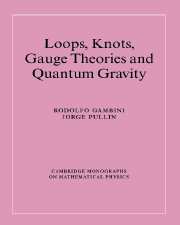Book contents
- Frontmatter
- Contents
- Foreword
- Preface
- 1 Holonomies and the group of loops
- 2 Loop coordinates and the extended group of loops
- 3 The loop representation
- 4 Maxwell theory
- 5 Yang–Mills theories
- 6 Lattice techniques
- 7 Quantum gravity
- 8 The loop representation of quantum gravity
- 9 Loop representation: further developments
- 10 Knot theory and physical states of quantum gravity
- 11 The extended loop representation of quantum gravity
- 12 Conclusions, present status and outlook
- References
- Index
3 - The loop representation
- Frontmatter
- Contents
- Foreword
- Preface
- 1 Holonomies and the group of loops
- 2 Loop coordinates and the extended group of loops
- 3 The loop representation
- 4 Maxwell theory
- 5 Yang–Mills theories
- 6 Lattice techniques
- 7 Quantum gravity
- 8 The loop representation of quantum gravity
- 9 Loop representation: further developments
- 10 Knot theory and physical states of quantum gravity
- 11 The extended loop representation of quantum gravity
- 12 Conclusions, present status and outlook
- References
- Index
Summary
Introduction
At the beginning of the 1970s gauge theories and in particular Yang–Mills theories appeared as the fundamental theories that described particle interactions. Two main perturbative results were established: the unification of electromagnetic and weak interactions and the proof of the renormalizability of Yang–Mills theory. However, the advent of proposals to describe strong interactions in terms of gauge theories — and in particular the establishment of QCD and the quark model for the hadrons — required the development of new non-perturbative techniques. Problems such as that of confinement, chiral symmetry breaking and the U(1) problem spawned interest in various non-perturbative alternatives to the usual treatment of quantum phenomena in gauge theories. Both at the continuum and lattice levels various attempts were made [44, 48, 12, 49, 50] to describe gauge theories in terms of extended objects as Wilson loops and holonomies. Some of these treatments started at a classical level [44], with the intention of completely reformulating and solving classical gauge theories in terms of loops. Other proposals were at the quantum mechanical level; for instance, trying to find a Schwinger–Dyson formulation in order to obtain a generating functional for the Green functions of gauge theories using the Wilson loop. Among these latter proposals we find the loop representation [5, 34], based on constructing a quantum representation of Hamiltonian gauge theories in terms of loops.
Information
- Type
- Chapter
- Information
- Loops, Knots, Gauge Theories and Quantum Gravity , pp. 52 - 87Publisher: Cambridge University PressPrint publication year: 1996
